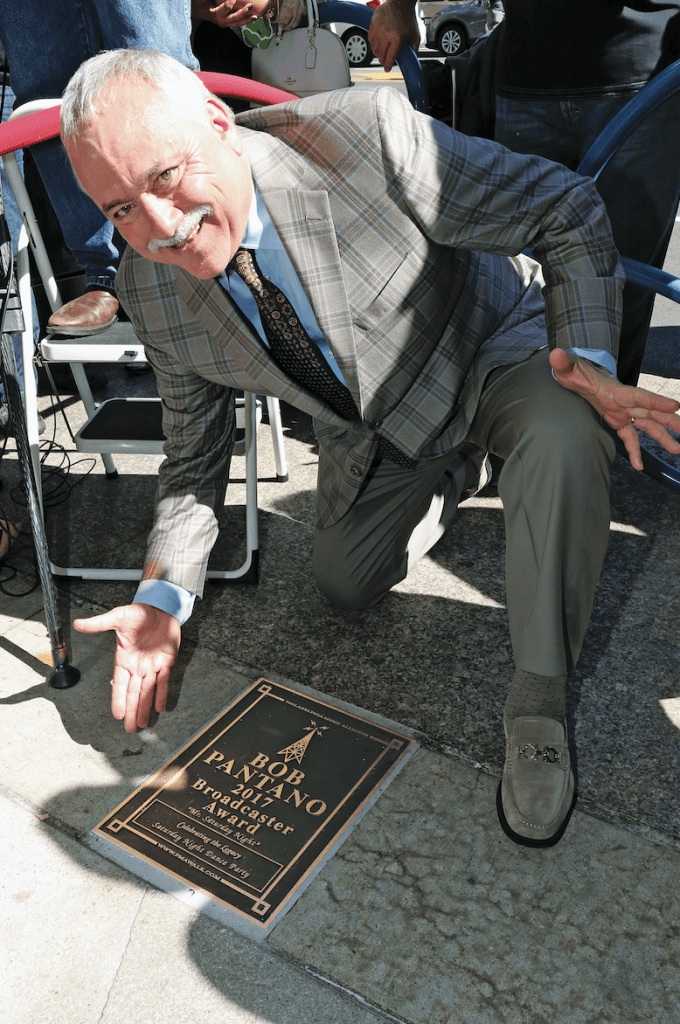Press & Video
Bob Pantano South Jersey Magazine Article
The life of the dance party By Chuck Darrow
Bob Pantano can count on one hand how many Saturday nights he’s spent at home over the last 40 years.
Only rare instances – most notably his wedding and the recovery from a leg injury – have pulled Pantano away from his Saturday Night Dance Party, which he’s hosted since Feb. 1977.
Today, Pantano maintains a regular schedule of personal appearances where he plays vintage rock and pop tracks perfect for dancing. Every Tuesday, he sets up shop at Kaminski’s in Cherry Hill. Wednesday, he’s at Diamond’s in Hamilton Township. Thursday finds him at Adelphia in Deptford, and on Fridays, he calls Popi’s Italian Restaurant in South Philly home.
But it’s his Saturday night bash – staged at Adelphia since 2010 – from which these other gigs and a four-plus-decades career have sprung. Not that Pantano ever expected this outcome from what he modestly refers to as an “idea.”
“I felt if we did a live broadcast from a local nightclub it would make a lot of sense,” he says. “The excitement of a live radio show with the music – disco was very hot then –put me on a nice roll. I thought it was a pretty good idea – maybe it would last a week or two.”

For the first five years, the show emanated from the long-shuttered Library disco in Philly and aired on WCAU-FM (98.1, now WOGL), which had switched to a disco-music format as the genre started to explode here and across the country.
Pantano at Philly’s Walk of Fame
But things went to a whole different level when Pantano, a South Philly native who first started his on-air career at Camden’s WCAM-AM (1310, now WSSJ), moved his weekly radio rave-up to WIOQ-FM (102.1) and, perhaps more importantly, to Ripley Music Hall, the nightclub on the 600 block of South Street owned by future megastar restaurateur Stephen Starr. At the time, the Ripley was the city’s hottest, hippest music venue.
“Opening night, we had over a 1,000 people,” recalls Pantano. “Traffic was backed up from Broad Street.”
In subsequent years, the program claimed multiple home bases, including such SJ rooms as the Crazy Horse Saloon in Barrington, the West L.A. Cafe in Cherry Hill and Resorts casino in Atlantic City. In 1988, Pantano returned to WOGL, which had instituted its still-in-place oldies format.
Pantano, who last year was immortalized with a plaque on the Philadelphia Music Alliance’s Walk of Fame along South Broad Street in Center City, may have been off by a couple thousand weeks in his estimation of his show’s staying power, but he’s certain he understands why his Saturday nights have been booked since.
“It’s all about the music,” he reasons, “it’s all about dancing.” He theorizes that today’s politically polarized society may be a catalyst for the program’s success.
“I have a party,” he says with a chuckle. “We all come together with the music. Everybody’s happy. There’s no left, no right. Just music and dancing and fun.”
“My philosophy is dance music can be anything,” he says. “It can be Motown, it can be the Philly sound, it can be disco, ’80s, ’90s, as long as it will motivate people to go on the dance floor – and sound great on the radio.”
“We play everything from The Temptations and Four Tops to the Sound of Philadelphia; we play Madonna and Whitney Houston and Prince and Michael Jackson. It’s a wide range of music, but there’s a connection of a sound.”
It wouldn’t shock many people to know that today’s Dance Party – which is simulcast on two Jersey Shore outlets, WEZW-FM (93.1) and WTTH-FM (96.1) – is popular with the AARP crowd. But what causes Pantano to swell with pride is that his fan base is multi-generational. According to the Neilsen ratings, which monitor radio listenership, the program is ranked No. 1 in its time slot across the board, including the 25-54 demographic, the group most coveted by advertisers.
“I have 20-year-olds coming in with their parents. They love it,” he says.
“It’s a refreshing change from the modern music. I’m not putting down modern music, but it’s synthetic. This is real music. You can reach out and touch it. It’s real music, real players, real instruments and real singing from the heart.”
Even on a holiday-season Saturday night, when the temperature made South Jersey feel more like Duluth, Minn., by
10 pm, the dance floor and adjacent bar area were packed.
While the majority in attendance appeared to be those on the older end of the Baby Boom generation, there were enough Gen Xers and Millennials to make their presence unexceptional.
As for the future, Pantano sees no reason why, health permitting, he can’t continue working Saturday nights for years to come. To illustrate, he notes a conversation that occurred last year on the occasion of the 40th anniversary of the Dance Party.
According to Pantano, WOGL execs asked him if he could “give us 10 more years.” When he replied in the affirmative, they said, “How about 20 more?” Pantano’s response? “I’ll try!”

